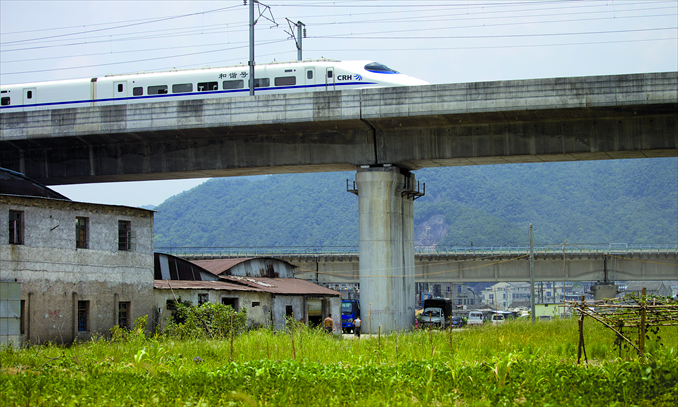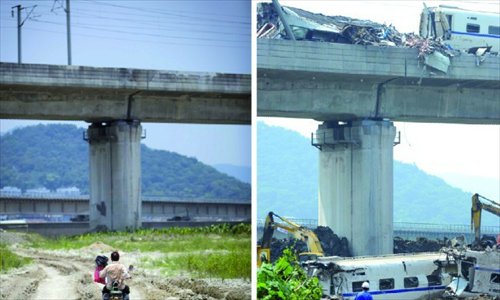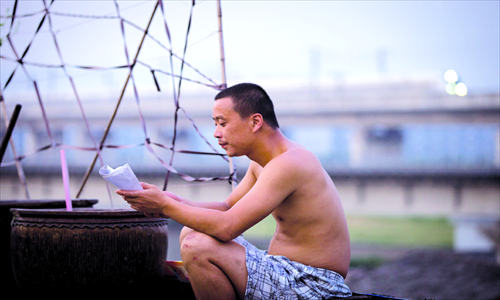Trained the wrong way

Imagine a rocky field filled with waist-high weeds, a hum of insects under the scorching midsummer sun. A regular view of China's rural areas, one might think, were it not for the thrumming of high-speed bullet trains speeding by.
One year ago, in the suburbs of Wenzhou, Zhejiang Province, a fatal bullet train crash left 40 passengers dead and injured 172, also causing economic losses estimated at 197.3 million yuan ($30.3 million).
Although boasting one of the fastest high-speed trains in the world, the way the Ministry of Railways (MOR) disposed of the wreckage and delayed the results of an investigation into the crash sparked public fury and widespread doubt as to the wisdom of the massive investment in high-speed railways.
One year after that horrible night, as new weeds have covered up the scene's desolation, how are the injured and the bereaved families coping?
One year on
On July 23, bullet train D301 heading from Beijing to Fuzhou, Fujian Province rear-ended D3115 from Hangzhou to Fuzhou, which had stopped on a viaduct due to losing power after being struck by lightning. Seven carriages careened off the tracks, with four of them plunging 17 meters off the viaduct.
Without this fatal day, 3-year-old Xiang Weiyi would be a healthy girl, growing under the protection and care of her parents. Now, everything has changed.
Dubbed the "miracle girl," Xiang Weiyi was the last survivor of the tragedy to be pulled from the wreckage after being trapped inside a carriage for 21 hours. Both her parents died in the collision.
"Yiyi is aware that there's something wrong with papa and mama since they no longer stay with her, but she avoids talking about them," said Xiang Yuyu, the little girl's uncle, who takes care of her now.
Every day, Yiyi goes to Shanghai Xinhua Hospital for rehabilitation. Although doctors managed to save her left leg from amputation, it will be hard to get back full mobility and motor function. "Two-thirds of her left leg muscles were cut. There's still an obvious difference with normal kids when she walks," he added.
After the crash, thousands of strangers donated to help her, but the family declined to accept any more money after the amount reached over 500,000 yuan. Xiang even turned away a 1 million yuan donation. "We saved the accident compensation money and donations into Yiyi's bank account, so that she can choose how to use it after she turns 18."
Although he appreciates the outpouring of help and support, Xiang still feels upset. "Yiyi is not a perfect girl, but her whole family treats her like a normal kid. However, she was still rejected to get into kindergarten," he said. Concerned that staying with her grandparents all day long is not good for his niece, Xiang commutes between Shanghai and Wenzhou every two weeks to take care of Yiyi and his own son in turn.
"We planned to let Yiyi have more time to get along with other kids in kindergarten, but she was rejected due to her disability," Xiang told the Global Times. Xiang understands the dilemma of kindergartens, who are worried about being liable if Yiyi injures herself further.
"But Yiyi is so eager to go to a school that won't allow her past its front door. When she's not willing to eat, we tell her that only good children who eat their meals can go to school, and she finishes her meal quickly," said Xiang.
Compared with Yiyi, Wang Hui's two-year-old daughter seems slightly more fortunate, as she still has her mother. Her family of three was ripped apart that night, when 35-year-old Zheng Hangzheng passed away in the crash, leaving his wife and baby girl behind.
"My daughter almost collapsed mentally last year. She kept crying and clutching his picture," Wang Jian, Wang Hui's father, told the Global Times.
After the accident, Wang Hui and her baby girl moved to live with her parents. "We try our best to avoid mentioning the crash at home; we don't even hang his picture on the wall. I hope the whole family will be able to stop grieving and move on," Wang Jian said.
As a housewife, Wang Hui is struggling financially since her husband died. She only has 300,000 yuan in compensation left after Zheng's parents bought three tombs at 210,000 yuan for their son and themselves using part of the compensation money. They also spent nearly 70,000 yuan on monks who prayed for the dead. "Only a small amount of money is left to Wang Hui. She is considering working again after her daughter goes to kindergarten," said Wang Jian.
Though unwilling to discuss the past, Wang Jian still complained about the MOR. "After the memorial service, the MOR officials fled and have never contacted us ever since. The investigation result was delayed, and the complete name list of all the passengers on the trains has still never been released," he said.
"The MOR did punish someone, but nobody was even jailed," Wang complained.

Lack of oversight
The investigation report, which was released five months after the deadly crash, blamed the cause on flaws in the trains' operation control system and on an inadequate emergency response by railway authorities.
A total of 54 people were identified as being accountable for the crash and received disciplinary punishment. Liu Zhijun and Zhang Shuguang, the former railway minister and deputy chief engineer of the ministry respectively, were mainly said as being to blame and were placed under investigation last year for alleged "severe violation of discipline." But the charges against them are not directly related to the train crash.
The former MOR spokesman, Wang Yongping, who was widely criticized for his awkward handling of the initial press conference after the crash, was suspended and transferred to Warsaw.
Wang Mengshu, chief engineer of the China Railway Tunnel Group, was barely reprieved in the final investigation report. "There weren't any problems with the train's signal system; it's unfair to blame mainly our high-speed train technology. Instead, MOR's inappropriate trimming of personnel and management is to be blamed," he told the Global Times.
Before the fatal crash, 27 countries over the world intended to buy high-speed trains from China, but only Thailand has such intentions now.
"The senior MOR officials have regretted putting the accident down to technology, which has greatly influenced the output of our high-speed trains. The Japanese ascribed the Amagasaki rail crash, which killed 106 passengers in 2005, to personal negligence rather than technological problems," Wang added.
Scene of the disaster
At the scene of the accident, wreaths for the deceased have been removed, memorial poems written on the viaduct pillar have been scrubbed off and there are no signs of the crash. Everything seems to show life has returned to normal. But the local villagers still remember the tragedy vividly.
"I will never forget that night, even now when there's a thunderstorm and lightning, I am little worried about the viaduct, and worry that such accidents will happen again," a local resident, who refused to disclose his full name, told the Global Times.

"The lightning that night was very weird as I had never seen such large lightning bolts," said Cai Qi, a local resident who witnessed the crash at home and arrived at the scene before the rescue services.
The lightning blew out the train's fuses, but the driver could have shifted from automatic driving to manual operation, and control center staff were responsible to inform the driver about the stopped train ahead, according to Wang Mengshu.
"The accident scene was a little bit odd. In the 1970s, a fighter plane also crashed at the same spot. There is a superstition among many villagers that the place is evil and that the ghosts of the dead haunt the area," Cai told the Global Times.
Cai rescued eight injured people that night. The local government rewarded 61 local citizens for their bravery. Cai topped the personal awards list and was given a prize of 2,800 yuan.
The velocity of the high-speed trains has obviously slowed down since the accident, according to Cai, but dozens still pass by every day.
Wang Mengshu denies that trains should slow down. "There's no need to do so. China's trains drive at 80 percent of their top speed. The bullet train between Beijing and Shanghai goes at 320 kilometers per hour, with a top-rated speed of 350 kilometers per hour" said Wang.
For him, leaving only one driver on each train was a major cause of the disaster. Where before, two drivers relayed each other, now, the remaining one cannot even visit the bathroom.
The other reason for Wang is that China lacks true railway professionals. "In Germany, a senior technician receives a higher salary than a senior engineer. We should set up more vocational schools and directly cultivate professional railway technicians," Wang said.
China once spent 50 billion yuan to buy 500 high-speed trains from Germany to access their technology but currently all the MOR senior technicians are required to go back to school for more training, according to Wang.
"The improper handling of the accident and the unfair conclusion to the investigation have greatly influenced the development of China's high-speed railway. There's still a long way to go," said Wang.